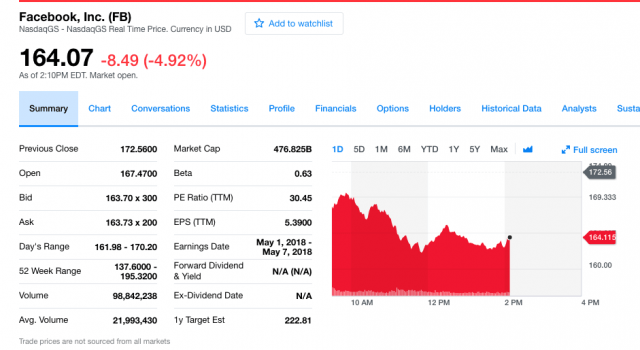Ever since social media blew up worldwide, there have been constant fears about the treasure trove of data that these tech giants collect and store. People have talked about how it could be exploited massively and put millions of people at risk. Well, it finally happened.
Facebook lost as much money as Tesla is worth
The Facebook scandal broke two days ago and has since caused an uproar about data security on the internet, apart from a growing movement to #DeleteFacebook, it has lost around $60 billion dollars of its market worth.
Many bigwigs of the industry have pitched in their two cents, most notable among them being Brian Acton, ex-CEO of WhatsApp, now a Facebook company.
He ever so ominously tweeted
https://twitter.com/brianacton/status/976231995846963201
There has been no word from Mark Zuckerberg, the CEO, only a statement from Facebook’s PR team so far.
The story behind…is scary
The real scary part is the reason for all this furor. According to whistleblower Christopher Wylie, who formerly worked at a data/election influencing/propaganda firm called Cambridge Analytica, his firm extrapolated data from around 50 million Facebook profiles during the 2016 US Presidential elections.

They built psychographic profiles of people from data that they collected without the user’s permission. As a result of these profiles, they were able to classify people on the basis of their political inclinations and then tailor ads and other campaigns at them in favor of Donald Trump.
Basically, they were telling you exactly what you were thinking and then using that inroad into your head to make you do what they wanted you too. #OnlineHypnosis.
Check out this article about psychographic targeting.
Read More: Facebook Manipulates Its Users By Telling Them What To Think, Read & Watch
According to Wylie, one of the founding members of Cambridge Analytica, their aim was to create a “web of disinformation”. They injected their own propaganda into people’s information streams, the sources where they collect information.
Playing with minds
As a result, over time, people start to perceive that version to be true and in Wylie’s words “behave in a certain way that I have led them to”. This warped perception of people fuels mistrust and suspicion and anger and hate that culminates in a divided country.
The driving force behind all of this is the data of 50 million people that the company exploited. If we even ignore the fact that Facebook somehow let a third party into such a large amount of data, the very fact that a privately held, for-profit organization has the raw materials to mount an information campaign to influence opinions on a global scale, is scary.
The power of data is indisputable, and its efficacy has been proven time and again. But the significant risks that come with data being in the hands of private players with virtually no oversight far outweigh any potential benefits that it offers.
The message to take home
This leak has also revealed the frailty of the human psyche. It’s abundantly clear that we are vulnerable to targeted campaigns that pander to our inner demons. These campaigns have been successful in making us do what they want with plain vanilla psychological manipulation.
This does not sound like democracy. There is no free will. There is a difference between political influencing, which everyone does, and this type of manipulation wherein there is a massive psychological warfare akin to what is done by the military in wartime to make me vote or not vote for a certain candidate
This massive data breach has reminded us once again of the pitfalls that come with putting such a large chunk of our data online, in the hands of a private party. Data is an effective weapon that can be wielded very potently by the right party. The fallout, especially the fact that Facebook lost $60 billion, that we have witnessed from a small slice of data being leaked should scare us enough to push us towards a more data secure future.
Sources: CNBC, New York Times, The Guardian, VICE News
Image Credits: Google Images
You would also like to read:
http://edtimes.in/2018/03/5-biggest-aadhaar-leaks-till-date/








































